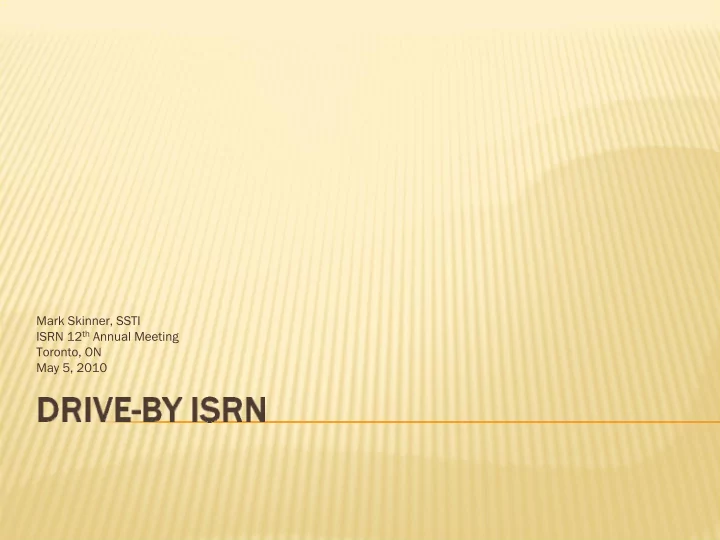

Mark Skinner, SSTI ISRN 12 th Annual Meeting Toronto, ON May 5, 2010
Policy Policy Observe/Probe Ob Research Research TBED TBED s y e v r u S o t d n o p s Practice Practice e Request Assistance R Glean Inquire Educa cate SSTI SSTI
The Canadian Innovations Systems Research Network (ISRN) is in the process of conducting a � five-year $2.5 million (Canadian) study to examine the impact and importance of cluster-driven innovation in Canada. According to the ISRN website, Innovation Systems and Economic Development: The Role of Local and Regional Clusters in Canada will “investigate how local networks of firms and supporting infrastructure of institutions, businesses and people in communities across Canada interact to spark economic growth.” The dynamics of 20 di The dynamics of 20 different ferent clusters across five re clusters a ross five regions and in both rura gions and in both rural and urb l and urban economies will be exa an economies will be examined throu mined through h the project. the project. Several of the working papers presented at the 2001 ISRN annual meeting may be of interest � to Digest readers, including: The Elus he Elusive Concept of Loca ive Concept of Localization Economies – lization Economies – Tow owards ards a Know a Knowledge-based T ledge-based Theor heory of Spatia y of Spatial l � Clust Clusteri ring ng by Anders Malmberg and Peter Maskell by Anders Malmberg and Peter Maskell Local Clusters, Inno Local Clusters, Innova vation Systems and Sustained tion Systems and Sustained Competitiveness Competitiveness by Lynn Mytelka and Fulvia by Lynn Mytelka and Fulvia � Far Farinell nelli Key Dr y Drivers ivers of of Fore Foreign F ign Firm’s Locational C Locational Choice ice: : Know Knowledge Nodes, Cross-Cu ledge Nodes, Cross-Cultura ltural Dif Differences and ferences and � Investment Motivation Investment Motivation by by Cl Cliff iff Wymbs Wymbs Regional Innovation Syst Regional Innovation Systems: T s: The Integration of Loca e Integration of Local “ l “Stick ticky” and G and Globa obal “ “Ubiquito quitous” Know Knowledge ledge by by � Bjor orn T. Asheim and Ar n T. Asheim and Arne Isaksen ne Isaksen
� “for anyone interested in cultivating the fullest understanding possible of the wide world of tech-based economic development, I believe one of the best newsletters/websites is Ontario's Regional Economic Development and Innovation (OREDI) Newsletter.” - SSTI Weekly Digest Feb 22, 2002
The Bush Administration
� Launch Recent � Shill ISRN books Research section of � Invite David Wolfe to newsletter participate in SSTI’s � Promote systems conferences approach to TBED in � Begin to offer Canadians federal policy member-rate discounts recommendations to SSTI conference � Secure funding for � Attend ISRN conferences TBED Resource Center � Secure funding for TBED mapping project
� “ Canada, with its ISRN project, is funding some of the most impressive long-term research into most impressive long-term research into understanding the composition, unique characteristics, and underlying policy elements of regional innovation systems regional innovation systems. ” - SSTI Weekly Digest July 19, 2004
The Bush Years: A Second Term
� Digest coverage of “Ontario’s Regional Innovation Network Dares Venture Where More TBED Must” � Cites ISRN conclusions as changes needed for U.S TBED policy. - SSTI Weekly Digest Dec. 19, 2007 � 2008-2010 -- D.C. policy meetings on changing federal innovation policy (Brookings, ITIF, Council, Kauffman, AAU, APLU, ASME, NSF, EDA, OSTP, NEC)
� “21st Century Cities in Canada: The Geography of Innovation, is enlightening, insightful, and frustrating – the final adjective because we should, but do not, have the same well grounded and succinctly articulated understanding of how American city-regions function systemically to encourage or thwart innovation and competitiveness.” - SSTI Weekly Digest Jan 13, 2010
Peered Network Approach to Studying Regional Innovation Can it be done with 366 Metro Areas in 50 Can it be done with 366 Metro Areas in 50 States? States?
International Participation in Study, Synthesis Removing the blinders of Yankee Imperialism? Removing the blinders of Yankee Imperialism?
Thank You, ISRN!
Recommend
More recommend